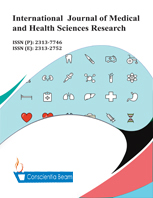Profile of Physiotherapist Educators in Anglophone West African Countries: A Cross-Sectional Study
DOI:
https://doi.org/10.18488/journal.9/2016.3.9/9.9.99.109Abstract
Background: In the last two decades, physiotherapy profession in many countries has transitioned their entry-level education to a Master’s or doctoral degree levels. Given these changes, there is a new need to discern the profile of physiotherapist educators in different countries. Objectives: This cross-sectional study was designed to investigate the profile of the physiotherapist lecturers from Anglophone West African countries and to compare the data with their USA counterparts. Methods: The Head of Department of all the physiotherapy programs in West African universities (N = 14) completed a questionnaire that sought information on the University’s debut date and ownership, faculty gender, educational qualification and academic rank. Results: The vast majority (93%) of the physiotherapy programs surveyed are located in public universities. There were 126 lecturers employed in the programs surveyed (average of 9 lecturers per program). In Nigeria, 72% of the lecturers were men, but in Ghana there was an equal (50:50) split between men and women. Fifty-nine percent (59%) of the lecturers in Nigeria had a Ph.D. and 32% were with MS degree. Thirty-four percent (34%) were a Senior lecturer, 19% Lecturer I, 10% Associate Professor/Reader and 10% Professor. More Nigerian lecturers attained higher (p<.05) educational qualification and academic rank than their Ghanaian peers. Conclusions: In Nigeria, the physiotherapy faculty workforce is dominated by men. The educational qualification and academic rank of the faculty in Nigeria is at par with their counterparts from the USA. The findings in this study have implication for faculty exchange/employment, and program development in West Africa.

